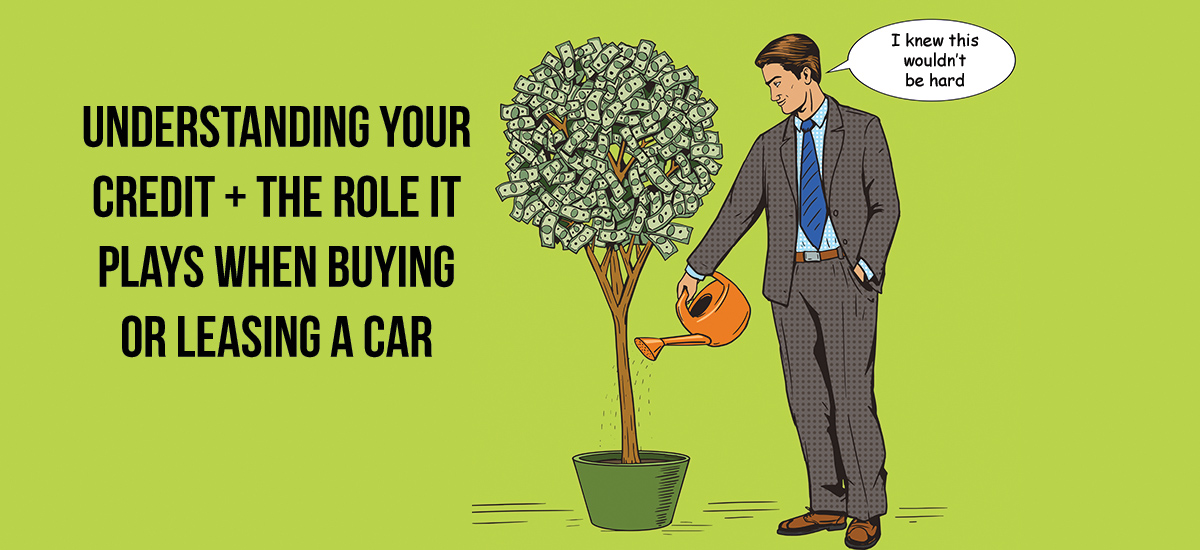
 Your Credit Estimate
Your Credit Estimate
 Your Credit
Your Credit
Your zip code helps us provide you with the most accurate vehicle pricing and vehicle availability.
We estimate your credit score to give you an idea of your monthly payments. To get an accurate payment amount, complete our credit application by clicking the Start Credit Application button below.
start credit application
Buying a new car is rewarding, but it can feel like a scary process if you don’t know much about the credit process or how your credit can affect your monthly payments. Since we are here to make our customers’ lives easier, we want to inform you about the credit basics when buying or leasing a new car.
People who are not able to pay cash for a purchase on something like a home or car (which is most people), can apply for a loan to get the money needed to make the purchase. A loan is an amount of money provided to an individual by a lender. The lender, in order to make money, will charge a percentage of the total amount of the load (called the principle) called an interest rate. About 90% of interest rates and the amount of money that the lender is willing to lend is determined by an individual’s FICO score. Typically, the higher the FICO score the lower the interest rate, and in some cases, the more money a lender will loan.
A FICO score is determined by using mathematical models that look at five areas in a person’s financial history and putting a value of “credit risk” based on that history. The five financial areas are payment history, current level of indebtedness, types of credit used and length of credit history, and new credit. Each of the five areas are weighted differently.
The most important factor in determining your credit score is how you have handled your credit in the past. Do you pay your bills on time? If you have missed payments -- how long did it take you to make the payment? Have you ever had an account go to a collections agency? What about a foreclosure, settlement or bankruptcy?
How much money do you currently owe on all of your credit accounts? This is important because if you are currently making payments that take a lot of your income, you look less likely to be able to continue paying for all of your bills.
Are you a millennial with awesome credit? While having good credit is great, as someone who doesn’t have many years of building credit, you’re still considered “riskier” than someone who has maintained several years of good credit.
Your FICO score considers how many new credit accounts you have. It looks at how many new accounts you have recently applied for and when you opened your last account. If you've opened several new accounts recently, you could be a greater credit risk because it looks as if you are trying to find several sources for money that you don’t have.
What type of accounts do you have? A credit “portfolio” that consists of credit from more diverse sources like credit cards, auto loans and mortgages, makes you look like you have diversified your spending and are able to balance the payments.
A person's FICO score will range between 300 and 850 -- and the higher scores are representative of better credit. In general, a FICO score above 650 indicates that the individual has a very good credit history. Credit scores below 620 can make it a little difficult for someone to find better interest rates or lenders who are willing to give them a loan.
One common misunderstanding people have about their credit score is that there is only one type of credit score -- but there are actually several different types of FICO scores. Over the year’s FICO has developed different credit scores because there are such different types of credit and risk behaviors can be specific to certain types of credit. For instance, when applying for a mortgage, lenders will use a different FICO score than a FICO score used to determine your eligibility for a credit card. Why? Not only are mortgage homes huge life commitments and can be a loan of hundreds of thousands of dollars, but they also have variables that may change through the years -- such as interest rates and refinancing.
According to FICO.com most auto lenders (including NowCar) use a FICO Auto Score 8 when evaluating a person for a loan. Introduced in 2009, the FICO 8 Auto Score uses the same five factors as mentioned above but puts more emphasis on an individual’s auto loan related credit history.
Unlike other types of credit scores, the FICO 8 Auto Score is not available for purchase so individuals can only access that score with a car dealer or lender. However, it is very important to be aware of your other FICO scores to make sure that everything on your credit report is accurate and up-to-date. Individuals have a FICO score at each of the three credit bureaus in the U.S., Equifax, TransUnion and Experian. The score at each of the bureaus may be slightly different because each bureau might have different credit history on you.